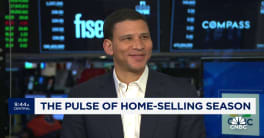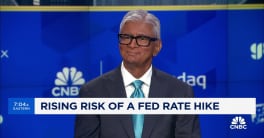Several Executive Branch surrogates indicated late last week that the Administration was sort of willing to compromise about the role of Freddie Mac and Fannie Mae in solving the current credit crunch. But the announcements made and the methods proposed seem to this reporter to be little, late, and misdirected. The two Government Sponsored Enterprises (GSEs) - Freddie and Fannie - seemed a little confused about what was happening as well.
For months the two GSEs have had a lid firmly clamped on the size of their
respective portfolios because of earlier accounting difficulties which, in the
case of Fannie, are not yet totally resolved. Any loans exceeding these portfolio
limits could not be held by the two mortgage giants but had to be spun
off in one of several ways into the private sector, and that private sector
is, of late, less willing to play the mortgage game.
For several weeks the director of the Office of Federal Housing Enterprise
Oversight (OFHEO), the agency within the Department of Housing and Urban Development
which supervises the two GSEs and President Bush himself have made it quite
clear that they had no intention of raising these portfolio caps in order to
allow the GSEs to infuse some much needed capital into the credit markets.
Instead, on Thursday Treasury Secretary Henry Paulson said he was "open" to temporarily allowing the two corporations to buy, bundle, and sell as securities loans exceeding the mandated limit for conventional mortgages - $417,000. Anything above that limit, which changes almost yearly, is considered a jumbo loan.
Paulson said that this revision of authority would come with "significant additional risk," and that the government must also create a regulator with an appropriate structure "to exercise necessary oversight."
Later in the day, in a letter to Senator Christopher Dodd, Secretary Paulson urged the Senate to pass legislation reforming Freddie and Fannie to help alleviate current stress in the mortgage markets.
At the same time OFHEO Director James B. Lockhart announced, on September 19 that OFHEO is "providing Fannie Mae and Freddie Mac with additional flexibility in managing their mortgage portfolios to comply with the portfolio caps agreed to last year."
The new rules governing the caps seem to be designed solely to allow the GSEs to eliminate a portion of the large cushions they have had to maintain below the portfolio caps to provide for market fluctuations which might otherwise throw the portfolios into non-compliance and Lockhart's statement outlines seven changes to the existing rules - changes we would never try to explain but you can read them yourself at www.ofheo.gov.
Brian Faith, Fannie Mae's Managing Director of Communications responded to Lockhart's changes as follows:
"The Director's decision to change the formula for the portfolio cap is directionally helpful because it provides us some limited flexibility. However, we still believe the more effective response, given the extent of the market disruption, would be to raise our portfolio cap by at least 10 percent so that we can more fully address the ongoing turmoil and bring much-needed liquidity to the mortgage market."
On Friday both Richard F. Syron, CEO of Freddie Mac and Daniel H. Mudd, President and CEO of Fannie Mae spoke before the U.S. House Committee on Financial Services. Mr. Mudd, in his prepared statement said that his corporation would like to do more to fulfill its mission to provide liquidity, stability, and affordability in the current market.
"We have done so many times in the past," Mudd said, "including the recent past. During the liquidity crisis in 1995 our portfolio grew by about $100 billion...to provide secondary market support when others withdrew it. Our portfolio has had periods of expansion and contraction in response to market demands.
"I am confident we could provide more liquidity help to the home finance market today without taking risks we are not capable of managing. Our purchases would comply with all relevant regulatory guidance and be consistent with the internal controls framework we have established with OFHEO. We are not the only answer to the liquidity crunch, but we can play a part in a measured, safe, and sound way."
Syron testified that, outside the market supported by the two GSEs, mortgage money is either unavailable or available at high rates. He cited the large numbers of lenders who have closed their doors and the "hundreds of thousands of subprime borrowers" who have already fallen into foreclosure this year.
He outlined some of the steps Freddie Mac has already taken in the crisis but warned against creating "perverse incentives. Many lenders and investors bear responsibilities that must be taken into account. We need to help homeowners - not bail out investors."
Syron also stressed the need for the nation to have an honest discussion about how much homeownership is actually sustainable and how to achieve that level.
And, like Mudd, he urged lifting the caps on portfolio growth to provide a needed back-stop bid for mortgages and to send a positive signal to the markets.
Then, on Saturday, the Wall Street Journal quoted a top regulator (undoubtedly from OFHEO) who speculated that those portfolio limits could be lifted in February if the two GSE's resume filing timely and audited financial statements.
February!







